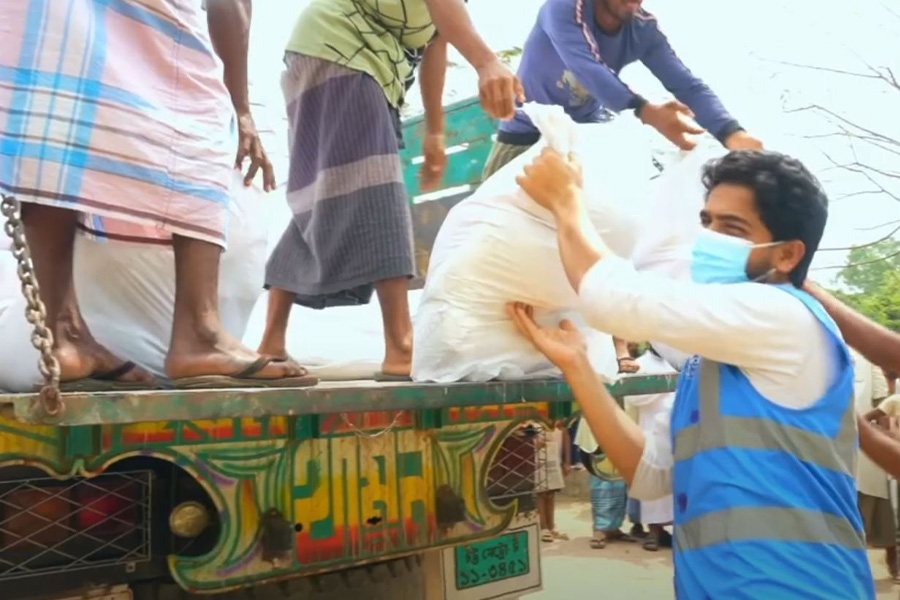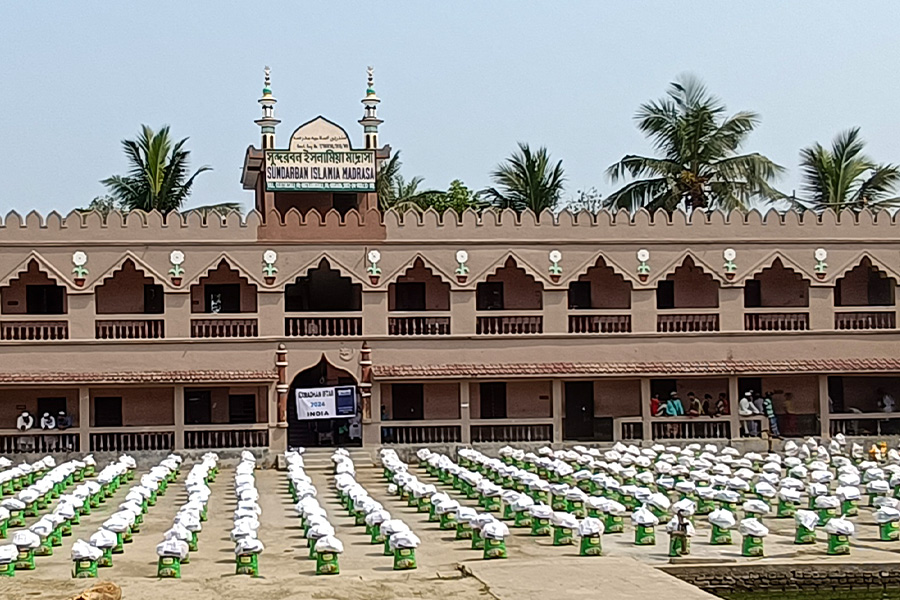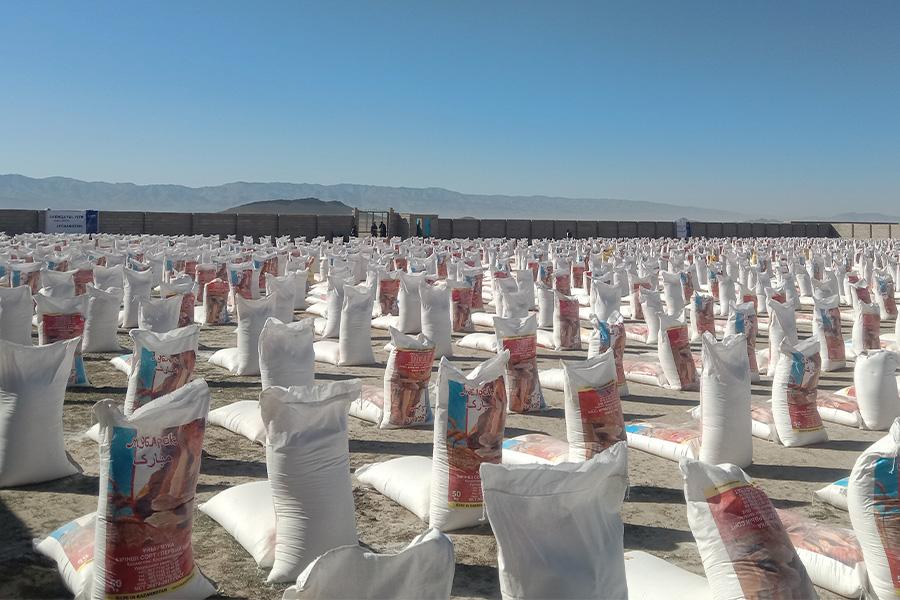What is Sadaqah?
By Imam Ghazali (Rahimahullah)
Sadaqah (giving in charity) is a deed designed to eliminate the spiritual malady of miserliness. But because the heart of the giver is not immune from show and insincerity, it has been emphasized that Sadaqah should always be given secretly. Certainly, Riyaa (ostentation) and miserliness are both very destructive diseases and Sadaqah that is rendered secretly is a powerful remedy for them.
In the grave, Riyaa assumes the form of a snake and miserliness takes the appearance of a scorpion and both are set on the sinner to inflict torture and pain. Thus, one who desists from spending in the Path of Allah out of miserliness has, in reality, incurred the punishment of scorpions and one who spends, but with insincerity, has, in fact opted for the punishment of snakes.
Sadaqah should not be Considered a Favour
If is quite common to feel that one is rendering a favour on which one confers a Sadaqah. This is an absolutely erroneous concept and should be dispelled. At times it is difficult to ascertain the presence of such malady in one’s heart. This can be achieved by carefully observing the condition of the heart after having given Sadaqah. For instance, if you expected an expression of gratitude in return of your Sadaqah, or subsequent to your Sadaqah, the recipient showed disrespect to you or maltreated you and this infuriated you, then this evidently explains that the Sadaqah had been by you as a favour.
A Cure for a Malady
A simple technique to eradicate such disease is to regard the needy as your benefactor, for he has become the cause of absolving you from your obligation and replacing the evil disease of miserliness with generosity.
Because Zakah and Sadaqah have been imposed to root out the undesirable malady of miserliness, the Prophet ﷺ, considering the object of its imposition would never bring the money of such funds into personal use. He would explain that this is the dirt of (people’s) wealth. Hence the Muslim who has become instrumental in washing away the dirt accumulated in your wealth has rendered you a favour and not vice versa.
What will your conception be of a surgeon who wishes to operate free of charge? People pay large amounts of money to get their physical ailments removed. Why then are we not grateful to those who remove our spiritual diseases without even charging us a single penny. Moreover, the physical ailments are of a transient nature and will at the most, result in death, whereas the spiritual ones have far reaching effects that will accompany the person in the afterlife too.
Because Zakah and Sadaqah play a chief role in fulfilling the needs of the poor and eliminating starvation from the world, this is also regarded as a pillar of Islam.
To facilitate the giving of Zakah and Sadaqah. Allah has firstly ordered the creation to love Him and then made the act of giving in charity a yardstick to measure the extent of love in the hearts of those who claim to do so. To demonstrate this love, believers are commanded to spend in the Path of Allah and thereby distinguish themselves from the false claimants of love.
If a human can sacrifice his entire possession for the petty love of another then sacrificing a small proportion of wealth for the Creator should not be felt as a burden. In fact, a Muslim should be prepared to give away all his possessions.
Those who Spend in the Path of Allah can be Divided into 3 Catergories
1) The ones who belong to the highest are those who give away, wholeheartedly everything they possess thus proving true their claim of love. Abu Bakr Siddeeq (ra) held this rank, which, on one occasion had brought every content of his house before the Messenger of Allah. And when asked, ‘What have you left for yourself?’ replied, ‘Allah and His Messenger ﷺ.’ On this occasion Umar (ra) had also brought his belongings and in reply to the same question said, ‘I have left as much as I brought.’ Upon hearing the answers of both, the Prophet ﷺ said (addressing the two), ‘Your ranks are evident from your replies.’
2) The second category consists of those who, although fail to give away their entire possession, neither spend unnecessarily on other avenues such as personal pursuits. Their spending is not unrestricted and liberal at all times like the first group; rather, they will wait for situations and needs to arise and when they do their generosity will know no bounds. They will spend as much as they are capable of spending. Much of the money they have accumulated stays with them awaiting opportunities for them to spend in the Cause of Allah.
3) The lowest category comprises those Muslims who suffice on paying their annual due. They will neither decrease in that nor increase. The ranks of the above mentioned categories and the degree of their love for Allah can easily be assessed by their conditions, i.e. how much and how frequently they spend.
You should endeavour to reach the highest of these categories. If not possible, you should at least avoid being classed amongst the lowest. To achieve this, apart from the obligatory acts, you will need to spend a little everyday. This will allow you to reach the lower stages of the second category, rising above the category of the miserly ones.
Muslims who are poor and unable to spend should not be disheartened by their inability, as the achievements of the rewards of Sadaqah are not only confined to giving in charity and helping the poor. They can be attained by other deeds as well. Any good deed, no matter how small, will earn them an equivalent reward. Some of these are mentioned below:
– To visit the sick.
– To attend a funeral.
– To assist someone in times of need, such as helping a labourer carry some of his weight.
– Interceding on someone’s behalf.
– To say a good word, such as consoling the grief stricken, or encouraging a despairing one.
These are all known as acts of Sadaqah and one does not have to be wealthy to accomplish them.
The Wisdom behind Spending Secretly
As mentioned before, it is important that when you spend, you should do so quietly and not publicly. A Hadith in this regard states. ‘To spend secretly in the Path of Allah extinguishes the Anger of Allah.’ On another occasion, it has been mentioned, ‘One who spends with the right hand such that it even goes unnoticed by the left (i.e. he exercises extreme sincerity) shall be resurrected among the seven categories of people who will be under the shade of the Throne of Allah on a day when there shall be no shade except that one.’
But that should not mean that you wait for the heart to reach that stage in order to spend, for this is clearly a deception from Shaytaan. You should continue to spend, regardless of the conditions of your heart and eventually you will reach your goal and be able to give wholeheartedly. Until then, Allah will reward you abundantly for overcoming your desires of withholding the money.
Secondly, spend the best of your possessions in the Path of Allah. Would it not be inappropriate to give something to Allah which you yourself dislike? As explained earlier, such spending has been designed to gauge one’s love for the Creator. Hence your selection of wealth will determine the intensity of your love for Him. Thirdly, you should spend wholeheartedly. With respect to this a Hadith states, ‘(The reward of spending) one Dirham can exceed (the reward of) one hundred thousand Dirhams;’ i.e. the reward of one who spends wholeheartedly and unrestrictedly will be multiplied manifold in contrast to one who does not do so.
Fourthly, the avenues of spending should also be thoughtfully and carefully chosen. In giving Sadaqah, preference should be given to one who has noble spiritual qualities over one who does not. If all the good qualities are not found in a single person then even the possessor of a single quality will be deserving of your Sadaqah. However, piety and Deeni knowledge should be given preference above all else. For only a pious and an ‘Aalim (Islamic scholar) will fulfil the prime objective of the provisions gifted by Allah.
They are the ones who live on this earth solely to make preparations for the Hereafter and consider this mortal world to be only a rest house wherefrom the souls will very soon depart. Hence such persons can surely be expected to utilize your Sadaqah in the correct avenues. The Prophet ﷺ has said, ‘Feed the pious people.’
Quranic Text Regarding Sadaqah
‘The believers … are steadfast in prayers, and in whose wealth there is a right acknowledged, for the poor and the destitute. (Qur’an 70:22-24).
‘That which you give in usury for increase through the property of (other) people, will have no increase with Allah: but that which you give for charity, seeking the Countenance of Allah, (will increase); it is those who will get a recompense multiplied.’ (Qur’an, 30:39)
‘Only those who believe in Our Signs, who when they are recited to them fall down in adoration, and celebrate the praises of their Rabb (only God and Sustainer), nor are they (ever) puffed up with pride. They forsake their beds of sleep, the while they call on their Rabb (only God and Sustainer), in Fear and Hope. And they spend (in charity) out of the sustenance which We have bestowed on them. Now no person knows what delights of the eye are kept hidden (in reserve) for them — as a reward for their (good) Deeds. Is then the man who believes no better than the man who is rebellious and wicked? Not equal are they. For those who believe and do righteous deeds are Gardens as hospitable Homes, for their (good) deeds.’ (Qur’an, 32:15-19)
‘The likeness of those who spend for Allah’s sake is as the likeness of a grain of corn, it grows seven ears every single ear has a hundred grains, and Allah multiplies (increases the reward of) for whom He wills, and Allah is sufficient for His creatures’ needs, All-Knower).’ (Qur’an, 2:261)
‘For Muslim men and women, for believing men and women for devout men and women for true men and women, for men and women who are patient and constant, for men and women who humble themselves, for men and women who give in charity, for men and women who fast, for men and women who guard their chastity, and for men and women who engage much in Allah’s remembrance for them has Allah prepared forgiveness and great reward.’ (Qur’an, 33:35)
‘Those who (in charity) spend of their goods by night and by day, in secret and in public have their reward with their Rabb (only God and Sustainer). On them shall be no fear nor shall they grieve.’ (Qur’an, 2:274)
Ahadith Regarding Sadaqah
The Prophet ﷺ has said: ‘Your smile for your brother is Sadaqah. Your removal of stones, thorns or bones from the paths of people is Sadaqah. Your guidance of a person who is lost is Sadaqah.’ (Bukhari)
Abu Hurairah (RA) reported Allah’s Messenger ﷺ as saying: ‘Charity does not in any way decrease the wealth and the servant who forgives, Allah adds to his respect; and the one who shows humility, Allah elevates him in the estimation (of the people).’ (Muslim)
Abu Hurairah (RA) narrated that the Prophet ﷺ said, ‘The example of a miser and the one who gives in charity, is like the example of two men wearing iron cloaks so tightly that their arms are raised forcibly towards their collar-bones. So, whenever a charitable person wants to give in charity, his cloak spreads over his body so much so that it wipes out his traces. But whenever the miser wants to give in charity, the rings (of the iron cloak) come closer to each other and press over his body and his hands get connected to his collar-bones. Abu Huraira heard the Prophet ﷺ saying, ‘The miser then tries to widen it but in vain.’ (Bukhari)
Qais ibn Abu Hazim narrated that…. Allah’s Messenger ﷺ said, ‘A Muslim is rewarded (in the Hereafter) for whatever he spends except for something that he spends on building.’ (Bukhari)
Mu’aadh bin Jabal (RA) related from the Prophet ﷺ ‘Sadaqah extinguishes sin as water extinguishes fire.’ (Ahmad, Tirmidhi)
Abu Hurairah (RA) narrated that the Prophet ﷺ said, ‘Every day two angels come down from Heaven and one of them says, ‘O Allah! Compensate every person who spends in Your cause’, and the other (angel) says, ‘O Allah! Destroy every miser.’’ (Bukhari)
The Prophet ﷺ has said: ‘A Muslim does not plant, or sow anything from which a person, animal or anything eats but it is considered as Sadaqah from him.’ (Bukhari)
The Prophet ﷺ has said:: ‘To smile in the company of your brother is charity. To command to do good deeds and to prevent others from doing evil is charity. To guide a person in a place where he can not get astray is charity. To remove troublesome things like thorns and bones from the road is charity. To pour water from your jug into the jug of your brother is charity. To guide a person with defective vision is charity for you.’ (Bukhari)
The Prophet ﷺ also said: ‘The believer’s shade on the Day of Resurrection will be his Sadaqah.’ (Ahmad)
Abu Dharr (RA) narrated that… Allah’s Messenger ﷺ said, ‘Those who have much wealth (in this world) will be the least rewarded (in the Hereafter) except those who do like this and like this (i.e., spend their money in charity).’ (Bukhari)
Abu Hurairah (RA) narrated that Allah’s Messenger ﷺ said: ‘Verily what a believer continues to receive (in the form of reward) for his action and his virtues after his death is the knowledge which he acquired and then disseminated; the pious son that he left behind him; or a copy of the Qur’an which he left as a legacy; or the mosques that he had built; or the inn that he had built for the wayfarers; or the canal that he caused to flow, or a sadaqah which he gave out of his property in the state when he was healthy and alive. (These are the acts of goodness the reward of which) reaches him even after his death.’ (Tirmidhi, Ibn Maja and Bayhaqi)
Abu Musa narrated that the Prophet ﷺ said, ‘Every Muslim has to give in sadaqah (charity).’ The people asked, ‘O Allah’s Messenger ﷺ! If someone has nothing to give, what will he do?’ He said, ‘He should work with his hands and benefit himself and also give in charity (from what he earns).’ The people further asked, ‘If he cannot do even that?’ He replied, ‘Then he should help the needy who appeal for help.’ Then the people asked, ‘If he cannot do that?’ He replied, ‘Then he should perform all that is good and keep away from all that is evil and this will be regarded as charitable deeds.’ (Bukhari)
Abu Bakr As-Siddiq (RA) narrated that Allah’s Messenger ﷺ said, ‘A crafty one, a miser, and one who keeps reminding people of what he has given, will not enter Paradise.’ (Tirmidhi)
Abu Hurairah narrated that ‘Abu Dharr said to the Messenger of Allah, ‘The wealthy people have all the rewards; they pray as we pray; they fast as we fast; and they have surplus wealth which they give in charity; but we have no wealth which we may give in charity.’ Allah’s Messenger ﷺ said: ‘Abu Dharr, should I not teach you phrases by which you acquire the rank of those who excel you? No one can acquire your rank except one who acts like you.’ He said, Why not, Allah’s Messenger ﷺ? He said: ‘Exalt Allah say: ‘Allahu Akbar’ (Allah is Most Great) after each prayer thirty-three times; and praise Him say: ‘Alhamdulillah’ (Praise be to Allah) thirty-three times; and glorify Him say: ‘Subhan Allah’ (Glory be to Allah) thirty-three times; and end it by saying, ‘La ilâha illallâhu wahdahu la shareeka lahu, lahul mulku wa lahul hamdu yuhyi wa yomeetu wa Huwa ‘ala kulli shai’in Qadeer.’ ( There is no god but Allah alone, He has no partner, to Him belongs the Kingdom, to Him praise is due and He has power over everything.) Your sins will be forgiven, even if they are like the foam of the sea.’’ (Abu Dawud)
The Messenger of Allah ﷺ said:
‘Sadaqah (charity) does not decrease wealth.’
(Muslim)
Be generous with Sadaqah throughout your life!



